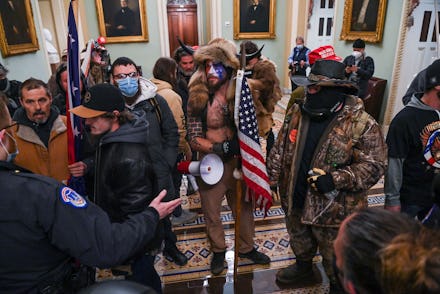The clues to the Capitol siege were on their T-shirts

Your level of surprise at last week’s Capitol riot is directly proportional to two things: how isolated you are from extremist rhetoric, and how literally you take said rhetoric when it appears on a garishly designed custom T-shirt. Even if your first reflex to Wednesday’s siege was smug confirmation in seeing one of the worst possible outcomes of the past four years come to life, it was still undeniably unnerving to see Confederate flags and a “Camp Auschwitz” hoodie chilling in the Capitol building.
Other shirts you might have seen promoted civil war (in font recalling Captain America: Civil War), Proud Boys sloganeering, and endless QAnon swag plotting to take out your local pedophiles. Paired with the literal gallows installed outside the Capitol, zip ties, pipe bombs, and explicit breadcrumbs of planned insurrection on tech platforms in the weeks leading up to the attack, the most dismissive reading of radical merch buckles under the weight of palpable violence.
Vox published a handy rundown of the worst of it on Tuesday, tracking the evolution from that “Rope. Tree. Journalist.” T-shirt at a 2016 rally to the open Nazi apologia on display last week. Michael Hayden, an investigative reporter for the Southern Poverty Law Center, tells Vox that the nakedness of bigotry and far-reaching conspiracy theories rival the shared evangelism you see from sports or music stan armies:
“That sort of sloganeering, shopping-mall vibe of those T-shirts is really, to stereotype, much more something you would be familiar with if you’re looking at the mainstream GOP base,” says Hayden. “To be wearing it like that in the middle of an insurrection really illustrates the degree to which that group of people in the United States has moved into a place that is much more openly radical and accepting of radical politics.”
A common refrain from President Trump’s earliest enablers went something like this: the conniving, unforgiving media takes him too literally, but his voters are smart enough to know that he demands to be taken seriously but not literally. As Osita Nwanevu points out at the New Republic, the limits of that fantasy were already punctured in far deadlier rampages, carried out by gunmen who took Trumpist, anti-immigrant rhetoric incredibly literally.
Although he’s using the winking, tacit invitation from Wednesday’s rally as proof of innocence — after months of inflamed rhetoric about a stolen election, and so-called patriots fighting like hell to overturn the results — some of his allies haven't been as subtle. At a December Turning Point USA event, freshman Rep. Madison Cawthorn urged supporters to call congressmen and “lightly threaten” them, saying “if you don’t start supporting election integrity, I’m coming after you, Madison Cawthorn is coming after you.” His glock-packing colleague Rep. Lauren Boebert was comparing the electoral college fight to 1776, but oh, come on, just the peaceful parts where we declared independence from the prevailing government!
The distinctions collapse when the revolutionary cosplay fashioned by mainstream Republicans sidles up to Proud Boys, victims to QAnon rhetoric, and earnest neo-Nazis, all under the same banner. Trump’s legacy is vast, but perhaps the most damaging energy in response to him was spent nitpicking about whether his followers’ calls for secession, civil war, or hanging the vice president are something to take seriously, when there they are, on national TV, trying to bring the T-shirts to life.